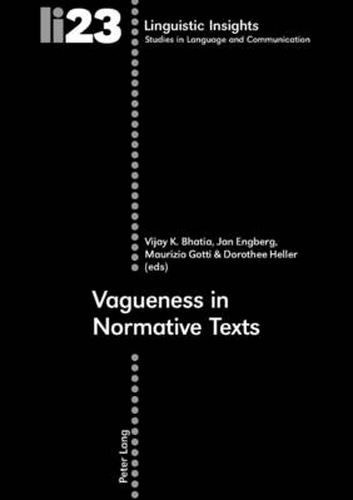Readings Newsletter
Become a Readings Member to make your shopping experience even easier.
Sign in or sign up for free!
You’re not far away from qualifying for FREE standard shipping within Australia
You’ve qualified for FREE standard shipping within Australia
The cart is loading…






This title is printed to order. This book may have been self-published. If so, we cannot guarantee the quality of the content. In the main most books will have gone through the editing process however some may not. We therefore suggest that you be aware of this before ordering this book. If in doubt check either the author or publisher’s details as we are unable to accept any returns unless they are faulty. Please contact us if you have any questions.
Normative texts are meant to be highly impersonal and decontextualised, yet at the same time they also deal with a range of human behaviour that is difficult to predict, which means they have to have a very high degree of determinacy on the one hand, and all-inclusiveness on the other. This poses a dilemma for the writer and interpreter of normative texts. The author of such texts must be determinate and vague at the same time, depending upon to what extent he or she can predict every conceivable contingency that may arise in the application of what he or she writes. The papers in this volume discuss important legal and linguistic aspects relating to the use of vagueness in legal drafting and demonstrate why such aspects are critical to our understanding of the way normative texts function.
$9.00 standard shipping within Australia
FREE standard shipping within Australia for orders over $100.00
Express & International shipping calculated at checkout
This title is printed to order. This book may have been self-published. If so, we cannot guarantee the quality of the content. In the main most books will have gone through the editing process however some may not. We therefore suggest that you be aware of this before ordering this book. If in doubt check either the author or publisher’s details as we are unable to accept any returns unless they are faulty. Please contact us if you have any questions.
Normative texts are meant to be highly impersonal and decontextualised, yet at the same time they also deal with a range of human behaviour that is difficult to predict, which means they have to have a very high degree of determinacy on the one hand, and all-inclusiveness on the other. This poses a dilemma for the writer and interpreter of normative texts. The author of such texts must be determinate and vague at the same time, depending upon to what extent he or she can predict every conceivable contingency that may arise in the application of what he or she writes. The papers in this volume discuss important legal and linguistic aspects relating to the use of vagueness in legal drafting and demonstrate why such aspects are critical to our understanding of the way normative texts function.